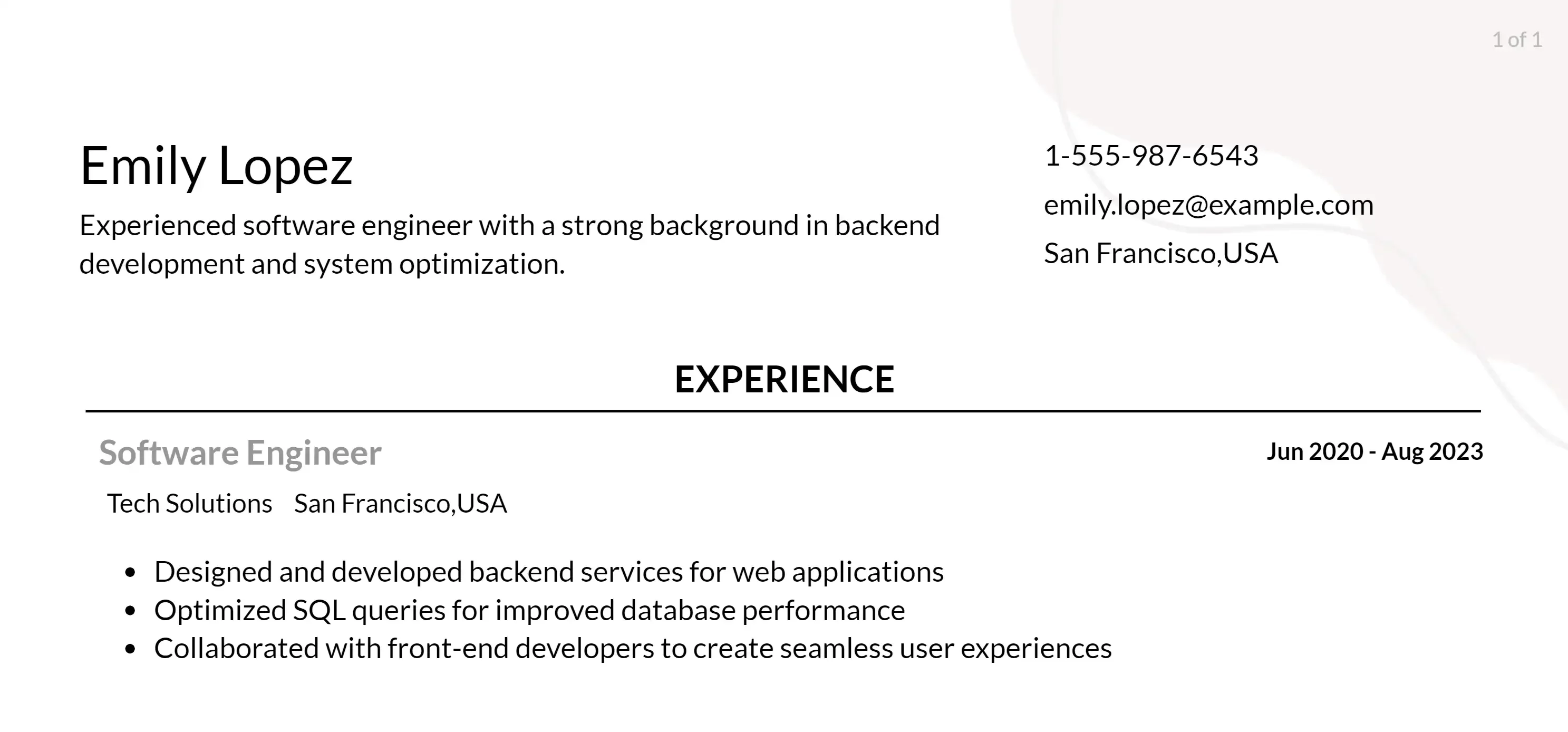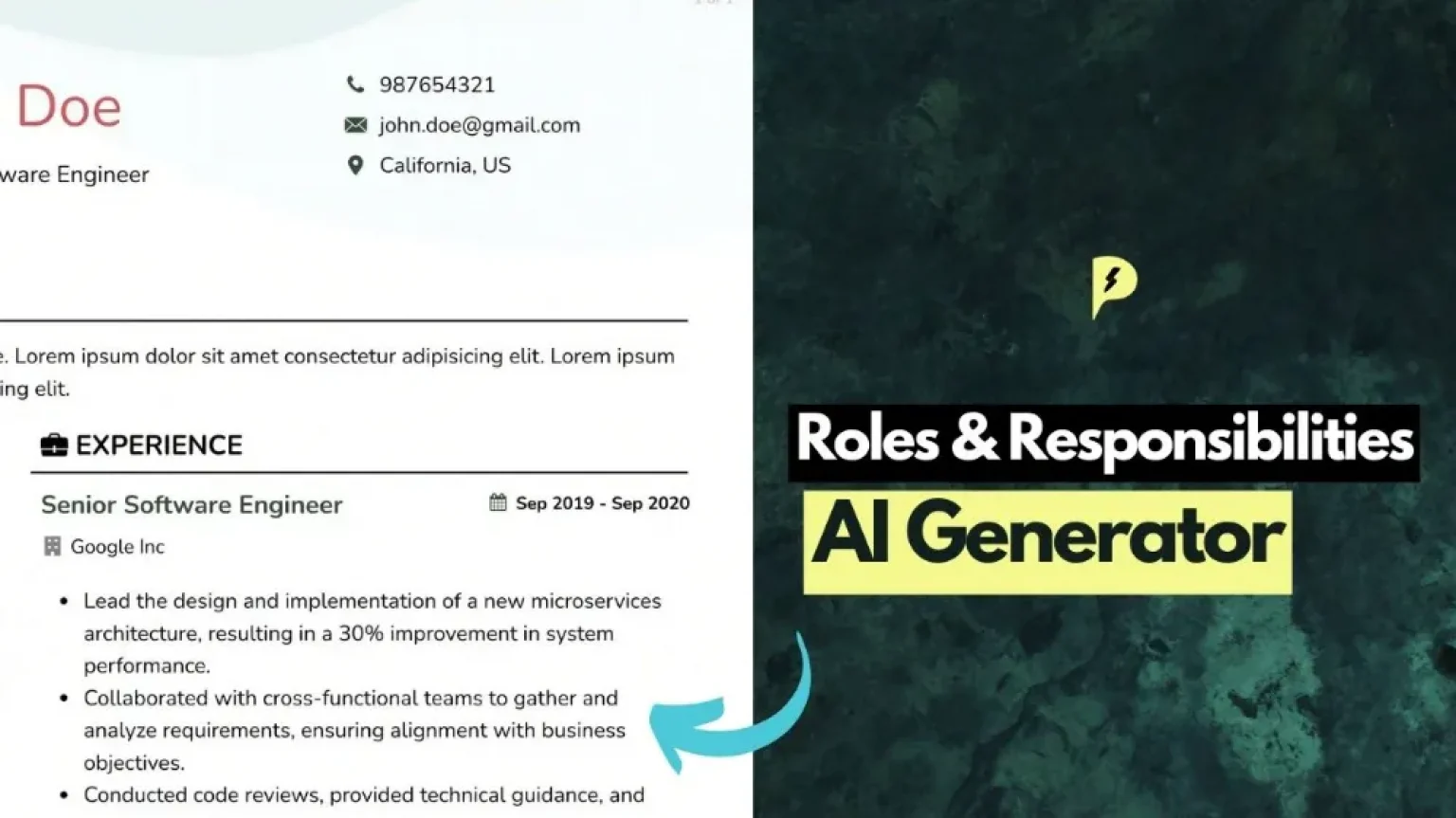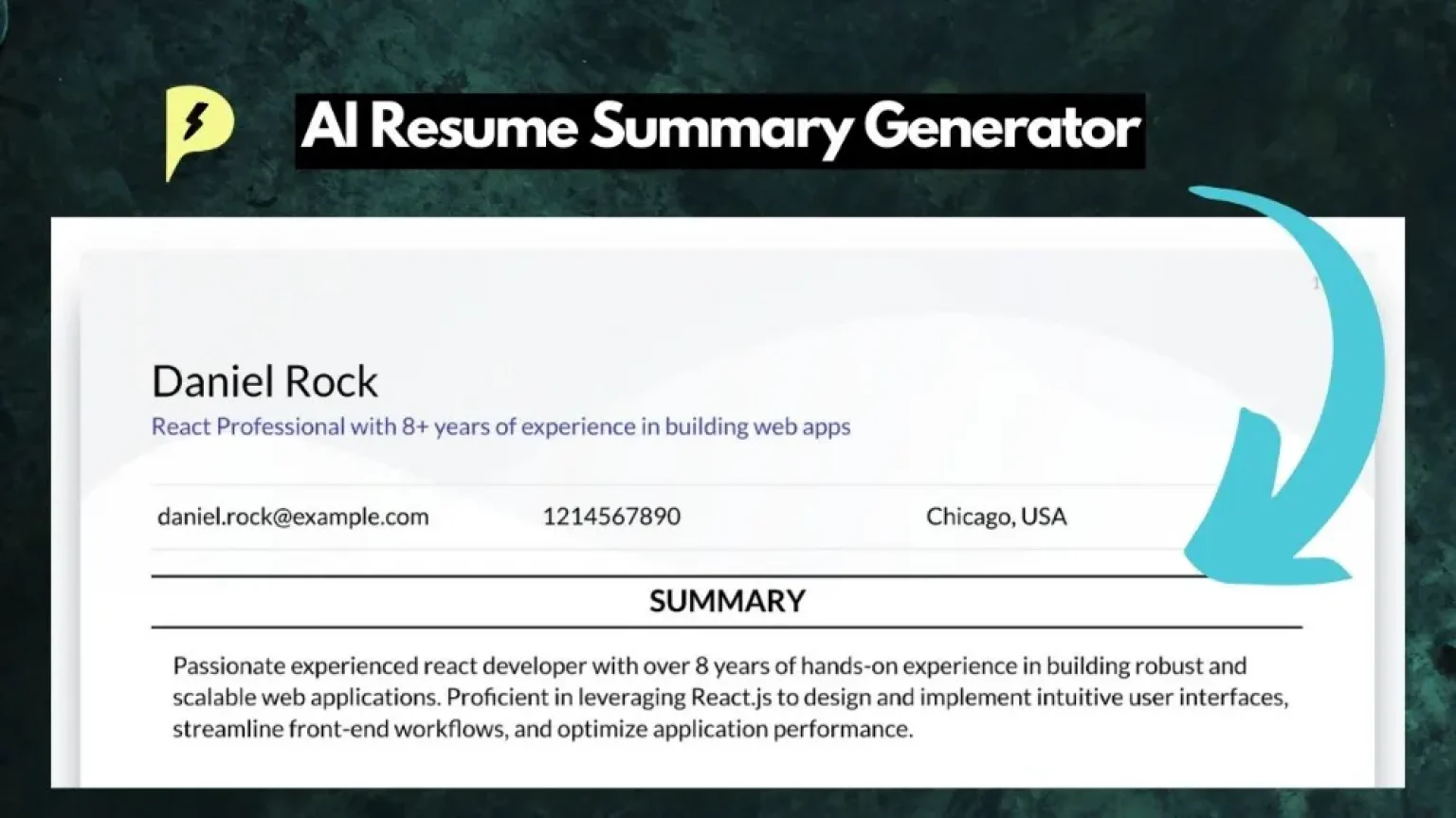Did you know that software engineering is one of the fastest-growing fields globally, with a 22% growth rate projected over the next decade? Or that entry-level software engineers can expect to earn around $85,000 annually in the U.S.? These figures show the importance of standing out when applying for a job in this competitive field. One of the most effective ways to do that is by clearly defining your roles and responsibilities on your resume.
Highlighting your contributions in previous roles not only showcases your skills but also makes it easier for hiring managers to see how you’ll fit into their team. With placements.app’s resume builder, adding your roles and responsibilities is a breeze, thanks to its intuitive interface and easy-to-use templates. Plus, you can access industry-specific suggestions to ensure you’re highlighting what matters most for your career goals.
Example #1: Fresher Entry-Level Software Engineer roles & responsibilities
As a fresher stepping into the software engineering field, you’ll want to highlight your academic projects, internships, and any coding experience to show your readiness. Focus on showcasing your knowledge of programming languages and your eagerness to contribute in a real-world environment. Below list are some of the samples for entry-level software engineer resume duties for fresher job positions.- Collaborated on a team project to develop a web-based application, gaining hands-on experience in full-stack development.
- Assisted in troubleshooting and debugging issues within existing software code, improving problem-solving skills in a real-world setting.
- Worked on implementing RESTful APIs, ensuring seamless communication between client and server-side functionalities.
- Participated in daily stand-up meetings, providing updates on progress and learning the basics of Agile methodologies.
- Developed and optimized small-scale programs in Java, improving the performance of applications used in academic projects.
Example #2: Entry Level Entry-Level Software Engineer roles & responsibilities
For entry-level software engineers, it’s crucial to present your technical skills, ability to work in a team, and willingness to learn quickly. Employers look for candidates who can hit the ground running and contribute to projects from day one. Below list are some of the samples for entry-level software engineer resume duties for entry level job positions.- Contributed to the development of front-end features using JavaScript, HTML, and CSS in a collaborative team environment.
- Assisted in back-end development by writing SQL queries and managing databases to support application functionalities.
- Worked with senior developers to design and implement software updates, enhancing overall system performance.
- Participated in code reviews and followed best practices to maintain clean, efficient, and error-free code.
- Collaborated with cross-functional teams to gather requirements and deliver software solutions that meet client needs.
Example #3: Junior Entry-Level Software Engineer roles & responsibilities
For junior software engineers, responsibilities tend to increase, as you’ll have some experience under your belt. Employers expect you to take on more complex tasks, mentor newer team members, and contribute significantly to larger projects. Below list are some of the samples for entry-level software engineer resume duties for junior job positions.- Designed and implemented new software features based on client requirements, contributing to the overall product roadmap.
- Conducted performance testing and optimization of applications to ensure smooth functioning under heavy user load.
- Mentored and guided new developers on coding standards and best practices, helping to improve the team’s overall output.
- Automated routine tasks using Python scripts, improving efficiency and reducing manual errors in data processing.
- Led debugging sessions for complex software issues, identifying root causes and delivering timely solutions.
Copy above entry level Entry-Level Software Engineer roles and responsibilities and paste in resume builder
Tips, Do’s & Don’ts For Entry Level Candidates
Tips
- Start with your technical skills. Mention the programming languages, tools, and technologies you are proficient in, even if your experience is limited to academic projects.
- Include relevant coursework or projects. If you’ve built any applications, even as part of a course, it’s worth mentioning to showcase your hands-on experience.
- Keep descriptions concise but impactful. Use action verbs like ‘Developed’, ‘Collaborated’, or ‘Assisted’ to emphasize your involvement in projects.
- Highlight internships, if any. Even unpaid internships or volunteer work can demonstrate your ability to apply technical knowledge in a real-world setting.
- Tailor your resume for each application. Make sure to align your skills with the job description, focusing on the technologies or frameworks the company is seeking.
DO’s
- Highlight your ability to work in a team by mentioning collaborations on past projects or internships.
- Emphasize your problem-solving skills with specific examples, like debugging a software issue or optimizing a program.
- Showcase your adaptability by listing diverse technologies or frameworks you’ve worked with, even if briefly.
- Include your knowledge of Agile or other software development methodologies to show you understand how modern teams function.
- Mention any contributions to open-source projects or personal coding projects that demonstrate your passion and initiative.
DON’TS
- Don’t list every single programming language you’ve ever encountered. Stick to the ones you are most comfortable with.
- Avoid vague phrases like ‘Good team player’ without specific examples. Use project or internship experience to demonstrate teamwork.
- Don’t over-exaggerate your role in projects. Be honest about your contributions and responsibilities.
- Avoid overly technical jargon that a hiring manager might not understand unless it directly applies to the job.
- Don’t include irrelevant experience. Keep your resume focused on software development and related skills.
Example #4: Senior Entry-Level Software Engineer roles & responsibilities
For senior-level software engineers, the focus should shift to leadership, mentoring, and complex problem-solving. Highlight your experience in managing projects, guiding teams, and making critical technical decisions. Senior roles demand both advanced technical skills and the ability to oversee entire project lifecycles. Below list are some of the samples for entry-level software engineer resume duties for senior job positions.- Led the design and implementation of a scalable microservices architecture, enhancing the system’s ability to handle increased traffic.
- Mentored junior developers, providing guidance on coding best practices, performance optimization, and career development.
- Collaborated with product managers and stakeholders to define project requirements and ensure timely delivery of high-quality software.
- Developed and maintained CI/CD pipelines, automating testing and deployment processes to improve team productivity.
- Identified and resolved complex technical issues across the software stack, reducing system downtime and enhancing overall reliability.
Example #5: Experienced Entry-Level Software Engineer roles & responsibilities
Experienced software engineers should focus on demonstrating their advanced technical abilities, their proficiency in various technologies, and their role in high-impact projects. Companies are looking for candidates who can contribute immediately with minimal training, so be sure to showcase your independent problem-solving skills and past accomplishments. Below list are some of the samples for entry-level software engineer resume duties for experienced job positions.- Defined the overall technical architecture for a multi-million dollar enterprise system, ensuring scalability, security, and performance.
- Provided technical leadership in the adoption of new tools and technologies, resulting in a 40% improvement in development speed.
- Collaborated with senior leadership to set technical roadmaps and align software development with business objectives.
- Led the migration of legacy systems to cloud infrastructure, reducing operational costs by 25% and improving system availability.
- Authored technical documentation and provided training sessions to upskill the engineering team on modern development practices.
Example #6: Expert Entry-Level Software Engineer roles & responsibilities
Experts in software engineering are expected to drive innovation, shape technical strategies, and mentor entire teams. When listing your responsibilities, focus on your role as a decision-maker, your expertise in specific technologies, and your ability to guide complex projects from conception to completion. Below list are some of the samples for entry-level software engineer resume duties for expert job positions.- Defined the overall technical architecture for a multi-million dollar enterprise system, ensuring scalability, security, and performance.
- Provided technical leadership in the adoption of new tools and technologies, resulting in a 40% improvement in development speed.
- Collaborated with senior leadership to set technical roadmaps and align software development with business objectives.
- Led the migration of legacy systems to cloud infrastructure, reducing operational costs by 25% and improving system availability.
- Authored technical documentation and provided training sessions to upskill the engineering team on modern development practices.
Copy above experienced Entry-Level Software Engineer roles and responsibilities and paste in resume builder
Tips, Do’s & Don’ts For Experienced Candidates
Tips
- Focus on specific achievements. For example, mention the percentage improvement in performance or cost reductions from your work.
- Highlight leadership and mentorship roles, especially if you’ve guided junior developers or managed projects.
- Emphasize your expertise in particular programming languages, frameworks, or technologies relevant to the job.
- Mention any large-scale projects you’ve worked on, especially if they had a significant business impact.
- Include your experience with modern methodologies like Agile, DevOps, or cloud infrastructure if relevant.
DO’s
- Quantify your impact. Use metrics to show how your contributions improved system performance, reduced costs, or enhanced user experience.
- Highlight leadership responsibilities, including mentoring junior developers and leading technical teams.
- Demonstrate your ability to solve complex technical problems, focusing on specific examples from your previous roles.
- Include your experience working with cross-functional teams to show that you understand the bigger picture in software development.
- Showcase your knowledge of modern development tools, frameworks, and methodologies.
DON’TS
- Don’t neglect to mention key technologies and tools you’ve used. Be specific about the stacks you’re familiar with.
- Avoid vague statements about your responsibilities. Provide clear examples of your work and the results achieved.
- Don’t overstate your leadership experience if you’ve primarily been an individual contributor.
- Avoid listing outdated programming languages or technologies unless specifically relevant to the job you’re applying for.
- Don’t focus solely on technical skills. Show how you’ve contributed to the company’s broader goals and worked well with teams.
Conclusion
To sum it up, crafting the perfect resume is essential for both fresher and experienced software engineers. Including clear, detailed roles and responsibilities can significantly boost your chances of landing that dream job. With placements.app resume builder, you can do it efficiently and effectively, ensuring you highlight your strengths and achievements without missing any crucial points. Whether you’re just starting or already seasoned, placements.app provides all the tools you need to make your resume shine in a competitive job market.



